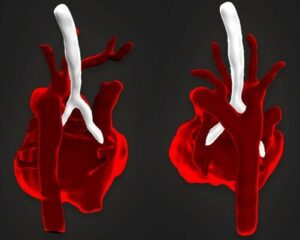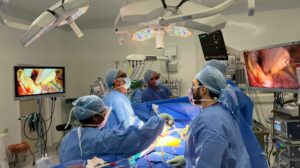Evelina London Children’s Hospital And Royal Brompton & Harefield Hospitals Specialist Care Showcase Pioneering Cardiac Advances At Arab Health 2023
Royal Brompton & Harefield Hospitals Specialist Care (RB&HH) and Evelina London Children’s Hospital, both part of Guy’s and St Thomas’ NHS Foundation Trust, will have a regional debut of life-saving,cutting-edge cardiac advances to address cardiovascular issues at Arab Health 2023 including 3D fetal cardiac imaging and machine learning Artificial Intelligence (AI),as well as the totally endoscopic 3D heart valve repair and replacement surgical technique. The event will take place from January 30 – February 2 2023.
In the Middle East, the prevalence of congenital heart disease is reported to be higher compared to most other countries. In addition, due to many people’s sedentary lifestyles, smoking, and unhealthy food consumption, acquired cardiovascular diseases (CVDs) remain one of the main causes of death for adults in the Middle East.
In the UAE, nearly 38% of adult deaths are attributed to cardiovascular disease (CVD). Faulty mitral valves are one of the most common causes of CVD and can be caused by age-related changes to the heart. Additionally, 1 out of every 100 babies is born with congenital heart disease, making heart problems the most common type of birth defect in the UAE.
During Arab Health 2023, the largest healthcare exhibition and medical congress in the Middle East, two unique cardiac simulations will be performed by consultant cardiologists from both hospitals in front of a live audience. Dr Owen Miller, consultant in paediatric and fetal cardiology at Evelina London Children’s Hospital, will showcase the latest fetal cardiac MRI method used to build 3D images of the fetal heart, and the surrounding anatomy, providing improved prenatal diagnosis. Mr Toufan Bahrami, consultant cardiac surgeon at Royal Brompton and Harefield hospitals, will present the innovative and totally endoscopic 3D valve repair surgical technique, using high precision surgery through a 3cm incision.
The simulated demonstrations will showcase the hospitals’ state-of-the-art techniques, which will help patients in the region identify and manage prenatal heart conditions as early as possible and provide hope to patients suffering life-threatening heart valve diseases. As part of their participation in this global event, Royal Brompton & Harefield Hospitals Specialist Care, and Evelina London Children’s Hospital will highlight pioneering technologies to precisely diagnose the type of congenital heart disease in the unborn baby during pregnancy and transform heart valve surgery for patients on a regional and international scale.
The first-of-its-kind 3D MRI scans to diagnose congenital heart disease before birth
Evelina London Children’s Hospital works in partnership with research teams based at King’s College London and are at the forefront of cutting-edge fetal and paediatric cardiac imaging research.The teams have jointly developed a world-first method to conduct three-dimensional (3D) magnetic resonance imaging (MRI) scans, which improve the ability to diagnose congenital heart disease in babies while still in the womb.
The hospital’s revolutionary MRI scanning technology uses unique motion-correction techniques to generate safe, comprehensive, high resolution 3D images of the fetal heart while still in the womb.
The novel cardiac scanning method takes a series of MRI images of the fetal heart, and uses advanced computer technology to build high-resolution, three-dimensional images of the fetal heart and surrounding anatomy. Taking the technology one step further, these 3D images can then be converted into a physical representation of the cardiac anatomy, via 3D printing technology.
Dr Owen Miller explains, “It is important to precisely diagnose the type of congenital heart disease in the unborn baby during pregnancy. If the infant requires surgical intervention soon after delivery, we can prepare for surgery and achieve the best outcomes.”
Along with advanced ultrasound methods, these 3D MRI images can provide important insights into structural heart defects before birth, allowing the teams to plan treatment and improve our patients’ care before and after the child is born more accurately.
Totally endoscopic heart valve repair and replacement surgery
Performed exclusively at Royal Brompton and Harefield hospitals, the totally endoscopic procedure is designed to treat patients with mitral valve disease but is also suitable for tricuspid and aortic valve repair. Taking around four hours and performed under general anaesthetic, a 3cm incision, without rib spreading, allows enough room for endoscopic instruments to rotate 360 degrees providing multiangled and precise views.
Mr Toufan Bahrami is at the forefront of pioneering new and fully endoscopic surgery for valve repair and replacement. The procedure offers an alternative to minimally invasive and sternotomy, allows for a quicker patient recovery time, higher precision, and better aesthetic results.
A high-definition 3D 4K camera is used to direct the procedure inside the heart and the surgeon can then repair or replace the damaged valve. During the procedure, the surgeon wears 3D glasses and is guided by images projected onto a 4K screen, which allows other surgeons in the room to see the same thing. The projected images can also be accessed remotely, allowing the hospital’s specialists to collaborate with other clinicians from anywhere in the world.
Totally endoscopic surgery has similar results to a sternotomy procedure but allows for a much smaller incision with less bleeding, greater precision, less pain, and less chance of infection, resulting in a quicker recovery. Due to its minimally invasive nature, patients are usually discharged after three days.
Within four weeks patients have reported being active again with minimal scarring and fewer complications when compared to a standard procedure. “Without minimally invasive and totally endoscopic options, we would not be able to provide these gold-standard results,” says Mr Bahrami.








